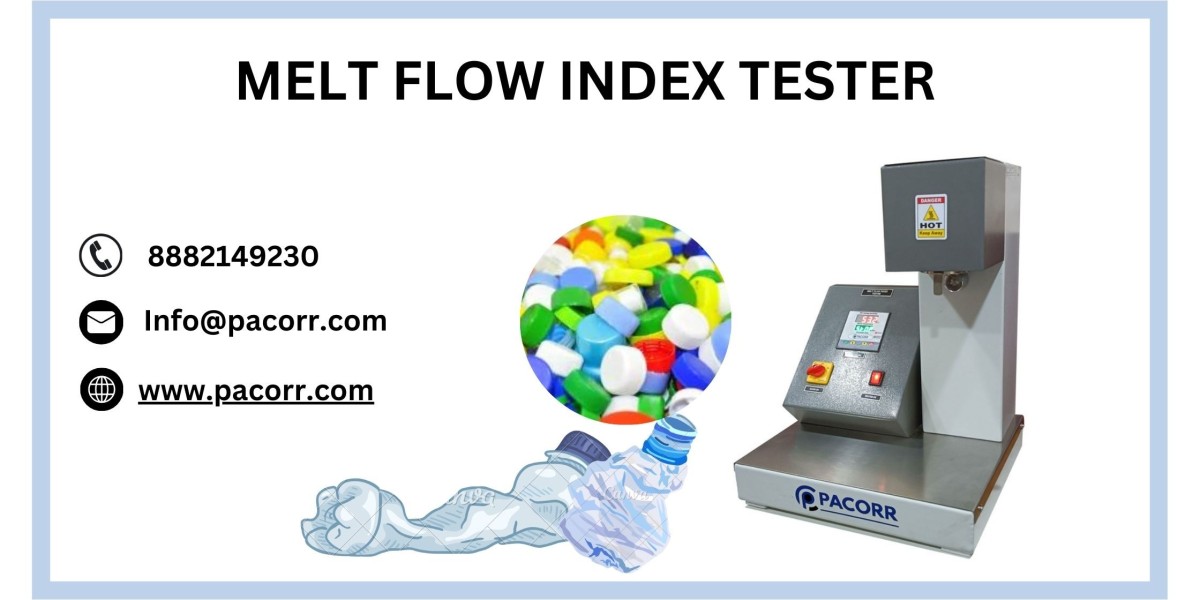What is a Melt Flow Index Tester?
A Melt Flow Index Tester, also known as an MFI Tester or Melt Flow Rate (MFR) Tester, measures the rate at which a thermoplastic polymer melts and flows under a specific temperature and load. The result, known as the Melt Flow Index (MFI), is expressed in grams per 10 minutes (g/10 min). This value provides critical information about the material's viscosity, which is essential for processing and quality control.
How Does a Melt Flow Index Tester Work?
The MFI Tester works by heating a polymer sample to a specific temperature in a standardized cylinder. A weight is then applied to the molten polymer, causing it to flow through a capillary die. The amount of polymer that flows through the die in a given time is measured and recorded as the Melt Flow Index Tester. This simple yet effective test helps in comparing different batches of materials and ensuring consistency in production.
Importance of Melt Flow Index in Polymer Testing
Quality Control: The MFI value is a key parameter in ensuring the quality and consistency of polymer products. Manufacturers can compare the MFI values of different batches to ensure they meet the required specifications.
Processability: Understanding the flow properties of polymers is crucial for processing techniques like injection moulding, extrusion, and blow moulding. The Melt Flow Index Tester provides insights into how a material will behave during these processes, helping manufacturers optimize their production settings.
Material Selection: For product designers and engineers, knowing the MFI of different polymers helps in selecting the right material for specific applications. A material with the appropriate MFI will ensure the final product meets performance and durability requirements.
Cost Efficiency: By using materials with the correct MFI, manufacturers can reduce waste and improve the efficiency of their production processes. This leads to cost savings and better resource management.
Applications of Melt Flow Index Testing
MFI testing is widely used in various industries, including:
· Automotive: Ensuring the materials used in car parts meet safety and performance standards.
· Packaging: Verifying the quality of plastic films and containers.
· Electronics: Testing the materials used in electronic components for reliability.
· Medical Devices: Ensuring that medical-grade plastics meet stringent quality requirements.
Choosing the Right Melt Flow Index Tester
When selecting an MFI Tester, consider factors such as the range of temperatures and loads it can handle, the ease of operation, and the precision of the measurements. At Pacoo.com, we offer a range of high-quality Melt Flow Index Tester designed to meet the diverse needs of the polymer industry. Our testers are equipped with advanced features to ensure accurate and reliable results, helping you maintain the highest standards of quality in your products.
Conclusion
The Melt Flow Index Tester is a vital tool in the polymer industry, providing essential data for quality control, process optimization, and material selection. By understanding and utilizing the MFI, manufacturers can ensure their products are of the highest quality and meet industry standards. Explore our range of Melt Flow Index Tester at Pacorr.com and take the first step towards superior polymer testing and quality assurance.
FAQ
1. What is a Melt Flow Index Tester?
A Melt Flow Index Tester (MFI Tester) is an instrument used to measure the flow properties of thermoplastic polymers. It determines the Melt Flow Index (MFI) of a polymer, which indicates how easily the material flows when melted.
2. How does a Melt Flow Index Tester work?
The Melt Flow Index Testing works by heating a polymer sample to a specific temperature within a standardized cylinder. A weight is then applied to the molten polymer, causing it to flow through a capillary die. The amount of polymer that flows through the die in a set period is measured and recorded as the MFI.
3. Why is the Melt Flow Index important?
The MFI provides crucial information about the viscosity and flow properties of a polymer. It is essential for quality control, ensuring consistency in production, optimizing processing conditions, and selecting suitable materials for specific applications.
4. What industries use Melt Flow Index Testers?
MFI Testers are used in various industries, including automotive, packaging, electronics, and medical devices. These industries rely on precise material properties to ensure the performance, safety, and reliability of their products.
5. How often should Melt Flow Index testing be performed?
The frequency of Melt Flow Index Testing depends on the production volume and the criticality of the material properties for the application. Regular testing is recommended for consistent quality control and to detect any variations in material batches.
6. Can different polymers have the same Melt Flow Index?
Yes, different polymers can have the same Melt Flow Index Testing but may have different molecular structures and properties. Therefore, the MFI should be considered alongside other material properties when selecting polymers for specific applications.
7. What factors can affect the Melt Flow Index?
Several factors can affect the MFI, including the molecular weight of the polymer, the presence of additives or fillers, the testing temperature, and the applied load. Precise control of these factors is crucial for accurate MFI measurements.
8. How do I choose the right Melt Flow Index Tester for my needs?
When choosing an MFI Tester, consider the range of temperatures and loads it can handle, the accuracy and repeatability of the measurements, ease of operation, and any additional features such as automated testing or data recording capabilities. At Pacoo.com, we offer a variety of MFI Testers designed to meet different testing requirements.
9. What is the difference between Melt Flow Index (MFI) and Melt Flow Rate (MFR)?
MFI and MFR are often used interchangeably. Both terms refer to the same measurement of the flow properties of a polymer under specific conditions. MFI is typically expressed in grams per 10 minutes (g/10 min), while MFR may sometimes be used in different units depending on the testing standards.
10. Where can I buy a Melt Flow Index Tester?
You can purchase high-quality Melt Flow Index Tester from Pacoo.com. We offer a range of testers with advanced features to ensure accurate and reliable results for your polymer testing needs.
If you have any more questions or need further assistance, please feel free to contact our support team at Pacoo.com.








